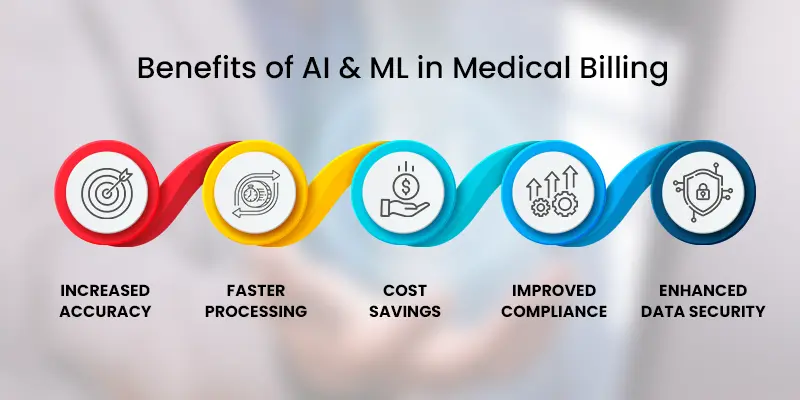Introduction
Medical billing can be complicated and time-consuming. It involves a lot of paperwork, checking details, and making sure everything is accurate. This is where Artificial Intelligence (AI) and Machine Learning (ML) come in. They are changing the way medical billing is done, making it faster, more accurate, and easier to manage. In this blog post, we’ll explore how AI and ML are revolutionizing medical billing.

What is AI and Machine Learning?
Artificial Intelligence (AI) is a type of technology that can perform tasks that usually require human intelligence. These tasks include understanding language, recognizing patterns, solving problems, and making decisions.
Machine Learning (ML) is a part of AI that allows computers to learn from data and improve over time without being programmed. ML algorithms find patterns in data and make predictions based on those patterns.
Benefits of AI and ML in Medical Billing
1. Increased Accuracy
One of the biggest challenges in medical billing is ensuring accuracy. Errors can lead to denied claims, delayed payments, and a lot of extra work. AI and ML can help reduce these errors by automatically checking for mistakes and correcting them. This means fewer denied claims and faster payments.
2. Faster Processing

Medical billing involves many steps, such as entering patient information, coding diagnoses and procedures, submitting claims, and following up on unpaid claims. AI and ML can speed up these processes by automating repetitive tasks. This means that medical billing can be done much faster, freeing up time for healthcare providers to focus on patient care.
3. Cost Savings
By reducing errors and speeding up the billing process, AI and ML can help healthcare providers save money. Fewer errors mean fewer denied claims and less time spent correcting mistakes. Faster processing means less time spent on billing tasks. These cost savings can be passed on to patients, making healthcare more affordable.
4. Improved Compliance
Healthcare is a heavily regulated industry, with many rules and regulations that must be followed. AI and ML can help ensure that medical billing complies with these regulations by automatically checking for compliance issues and correcting them. This means fewer fines and penalties for healthcare providers.
5. Enhanced Data Security
Medical billing involves sensitive patient information, which must be kept secure. AI and ML can help enhance data security by detecting and preventing fraud, identifying unusual patterns, and protecting against cyberattacks. This means that patient information is kept safe and secure.
How AI and ML are Used in Medical Billing
1. Automated Coding
Medical coding is the process of translating diagnoses and procedures into codes that can be used for billing. This can be a time-consuming and error-prone process. AI and ML can automate medical coding by analyzing patient records and assigning the correct codes. This means faster and more accurate coding, which leads to fewer denied claims and faster payments.
2. Predictive Analytics
Predictive analytics uses AI and ML to analyze data and make predictions about future outcomes. In medical billing, predictive analytics can be used to identify patterns and trends that can help healthcare providers optimize their billing processes. For example, predictive analytics can identify which claims are most likely to be denied, allowing healthcare providers to address issues before they become problems.
3. Fraud Detection
Fraud is a significant issue in medical billing. AI and ML can help detect and prevent fraud by analyzing data and identifying unusual patterns. For example, AI and ML can detect if a provider is billing for services that were not provided or if a patient is receiving treatments that are not medically necessary. This means that fraud can be detected and prevented before it becomes a problem.
4. Patient Eligibility Verification
Verifying patient eligibility for insurance coverage is an important part of the medical billing process. AI and ML can automate this process by analyzing patient records and checking them against insurance databases. This means that patient eligibility can be verified quickly and accurately, reducing the risk of denied claims and ensuring that patients receive the care they need.
5. Revenue Cycle Management
Revenue cycle management (RCM) is the process of managing the financial aspects of healthcare, from patient registration to final payment. AI and ML can help optimize RCM by automating tasks, reducing errors, and providing insights into financial performance. This means that healthcare providers can improve their cash flow and financial health, allowing them to focus on providing quality care to patients.
Challenges and Considerations

While AI and ML offer many benefits for medical billing, there are also some challenges and considerations to keep in mind:
1. Implementation Costs
Implementing AI and ML can be expensive. Healthcare providers need to invest in the necessary technology and infrastructure, as well as training for staff. However, the cost savings and efficiency gains from AI and ML can offset these initial costs over time.
2. Data Privacy
Medical billing involves sensitive patient information, which must be kept private and secure. Healthcare providers need to ensure that AI and ML systems comply with data privacy regulations and protect patient information from unauthorized access.
3. Integration with Existing Systems
AI and ML systems need to be integrated with existing medical billing systems and processes. This can be challenging, especially for healthcare providers with legacy systems. However, many AI and ML solutions are designed to be compatible with existing systems, making integration easier.
Conclusion
AI and ML are revolutionizing medical billing by increasing accuracy, speeding up processing, reducing costs, improving compliance, and enhancing data security. By automating tasks, analyzing data, and making predictions, AI and ML can help healthcare providers optimize their billing processes and improve their financial health. While there are some challenges and considerations to keep in mind, the benefits of AI and ML in medical billing are clear. As technology continues to advance, we can expect to see even more improvements in medical billing, making it easier and more efficient for healthcare providers and patients alike.
Related Resource
About the Author





